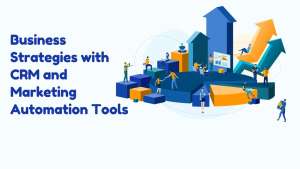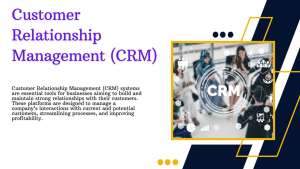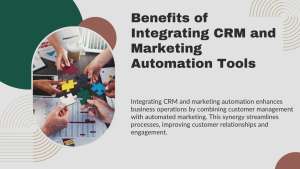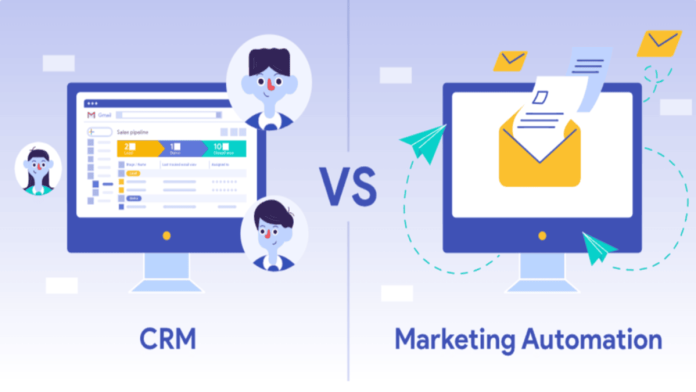Optimizing Business Strategies with CRM and Marketing Automation Tools

Customer Relationship Management (CRM) systems are designed to help businesses manage interactions with existing and potential customers. A CRM captures customer data, allowing companies to track and analyze every interaction a customer has with their brand. This can include everything from purchase histories to customer service inquiries, ultimately supporting sales efforts and improving customer retention by fostering more personalized communication.
On the other hand, marketing automation tools focus primarily on automating marketing tasks and workflows. These tools streamline processes like email marketing, social media campaigns, and lead generation. By automating repetitive tasks, marketing automation allows teams to create more targeted and timely marketing campaigns, enhancing efficiency and ensuring that potential leads are nurtured throughout their buying journey.
Both CRM and marketing automation tools are essential for modern businesses looking to optimize their customer interactions and marketing strategies. Understanding their unique functions and how they complement each other is vital for leveraging their full potential. By integrating these systems, businesses can create seamless experiences that drive customer satisfaction and business growth. Ultimately, choosing the right combination of tools depends on specific business needs and goals.
Understanding CRM: Key Features and Benefits

Customer Relationship Management (CRM) systems are essential tools for businesses aiming to build and maintain strong relationships with their customers. These platforms are designed to manage a company’s interactions with current and potential customers, streamlining processes, and improving profitability.
Key Features of CRM Systems
- Contact Management: One of the primary features of CRM software is contact management. This allows businesses to organize customer information, including names, addresses, purchase history, and interaction details, making it easy to access and update. With everything in a centralized database, sales teams can access important customer information in real-time, enhancing communication and ensuring no opportunity slips through the cracks.
- Lead Management: Another key feature is lead management, which helps track potential sales leads from initiation to conversion. This feature enables marketing and sales teams to focus on the most promising prospects, increasing efficiency and closing rates.
- Analytics and Reporting: Additionally, CRM systems often include tools for analytics and reporting. These tools provide insights into sales performance, customer behavior, and market trends, helping businesses make informed decisions.
Benefits of CRM Systems
The benefits of using CRM systems extend beyond sales.
- Enhanced Customer Service: Improved customer service, for instance, is a significant advantage. By having access to detailed customer histories and preferences, support teams can offer personalized service, leading to higher customer satisfaction and loyalty.
- Task Automation: Automation of routine tasks, such as sending follow-up emails or scheduling appointments, is another benefit. This allows teams to focus on more strategic initiatives, ultimately driving business growth.
- Productivity Boost: By leveraging CRM systems, businesses not only improve customer relationships but also enhance team productivity and streamline operations.
Marketing Automation Tools: Streamlining Marketing Efforts

Marketing automation tools have become indispensable assets for businesses seeking to enhance their marketing efforts with minimal manual intervention.
- Task Management: These tools streamline and automate marketing tasks, helping companies engage with their audience more efficiently. At the core of marketing automation is its ability to manage repetitive tasks such as email campaigns, social media posts, and ad targeting, freeing up time for marketers to focus on strategy and creativity.
- Lead Nurturing: One of the key functions of marketing automation tools is lead nurturing. By automating personalized email sequences, businesses can guide prospects through the sales funnel, ensuring consistent communication that aligns with the buyer’s journey.
- Audience Segmentation: Marketing automation also enables robust segmenting capabilities, allowing businesses to tailor their messaging to different audience segments based on behavior, preferences, or demographics, thus increasing engagement and conversion rates.
Advantages of Marketing Automation Tools
- Data-Driven Insights: Furthermore, these tools provide valuable insights through analytics and reporting features. By tracking the performance of campaigns and user interactions, businesses can make data-driven decisions to optimize their marketing strategies. This real-time data helps identify what works and what doesn’t, enabling continuous improvement.
- Efficiency and Scalability: Among the advantages of marketing automation are improved efficiency, scalability, and a better return on investment (ROI).
- Better ROI: By automating routine tasks, businesses can operate more efficiently and scale their efforts without significant increases in resources. This, in turn, allows for better allocation of time and budget, ultimately leading to higher ROI.
In summary, marketing automation tools offer businesses the opportunity to optimize their marketing efforts through automated processes, targeted communications, and actionable insights, making them a vital component of modern marketing strategies.
CRM and Marketing Automation Tool: Key Differences

When it comes to managing customer relationships and automating marketing tasks, CRM (Customer Relationship Management) and marketing automation tools often come up in discussions. Both are essential for streamlining business operations, but they serve distinct purposes.
CRM Systems: Focusing on Customer Relationships
CRM systems are primarily focused on managing and nurturing customer relationships. These tools store and organize customer data, track interactions, and help sales teams manage their pipeline. The main goal of a CRM is to enhance customer relationships by providing a comprehensive view of customer interactions, enabling personalized communication.
Sales forecasting, contact management, and lead management are some of the core features offered by CRM systems.
Marketing Automation Tools: Streamlining Marketing Efforts
On the other hand, marketing automation tools are designed to automate repetitive marketing tasks. They help streamline processes such as email marketing campaigns, social media posting, and lead nurturing. These tools focus on attracting, engaging, and converting potential customers through automated workflows. By segmenting audiences and personalizing content, businesses can nurture leads through the sales funnel more efficiently. Key features often include automated email sequences, campaign tracking, and analytics.
Key Differences Between CRM and Marketing Automation Tools
CRM tools aim to manage ongoing customer relationships, while marketing automation tools concentrate on automating marketing efforts to generate and nurture leads. However, both can complement each other effectively. When integrated, businesses can harness the power of lead data and customer insights, providing a seamless experience from initial contact through to conversion and beyond.
Understanding these differences helps businesses choose the right combination of tools to optimize both marketing and sales functions, ultimately leading to better customer satisfaction and increased revenue.
Benefits of Integrating CRM and Marketing Automation Tools

Integrating Customer Relationship Management (CRM) and marketing automation tools can significantly enhance business operations by combining the strengths of both systems. While CRM focuses on managing customer interactions and sales processes, marketing automation streamlines and automates marketing tasks. Together, they provide a comprehensive approach to managing and nurturing customer relationships throughout their journey.
- Enhanced Marketing Efforts with Customer Insights: When integrated, CRM systems offer valuable customer data that can help tailor marketing efforts to specific segments. This data is further enhanced by marketing automation tools, which track customer behavior and engagement metrics. By merging these insights, businesses can craft personalized marketing campaigns that address the unique needs and preferences of their audience, leading to higher conversion rates.
- Streamlined Communication Between Teams: Moreover, integration allows for more efficient communication between marketing and sales teams. Marketing automation tools can qualify leads based on engagement, flighting them directly to the CRM for sales follow-up. This seamless transition ensures no lead is left unattended while optimizing team efforts based on qualified data insights.
- Improved Customer Experience: Another benefit is improved customer experience. By aligning marketing and CRM strategies, businesses can provide consistent, timely, and relevant messaging across different touchpoints. This level of personalization and coordination can significantly enhance customer satisfaction and loyalty.
- CRM & Automation Synergy: Ultimately, integrating CRM with marketing automation tools empowers businesses to harness the full potential of their customer data, leading to more effective marketing strategies and better sales outcomes. For companies looking to boost their competitive edge, this integration is not just beneficial but essential.
Conclusion: Choosing the Right Tools for Your Business Needs
Selecting the right tools for your business depends on understanding your specific goals and needs.
CRM Systems: Enhancing Customer Relationships
Customer Relationship Management (CRM) systems and marketing automation tools serve different purposes, yet they can complement each other when effectively integrated.
CRM systems are vital for managing customer interactions and data throughout the customer lifecycle. They help in maintaining detailed customer records, tracking sales, and providing actionable insights based on customer behavior. If your primary goal is to enhance customer relationships and improve sales efficiency, investing in a robust CRM system should be a priority.
Marketing Automation Tools: Streamlining Efforts
On the other hand, marketing automation tools streamline marketing efforts by automating repetitive tasks, segmenting your audience, and providing insights into campaign performance. They are perfect for businesses looking to nurture leads, increase engagement, and execute data-driven marketing strategies at scale.
Integration: Maximizing Impact
For businesses aiming to maximize their impact, integrating both CRM and marketing automation tools can offer a comprehensive view of customer interactions from the initial marketing touchpoint to post-sale support. This integration enables seamless data flow between sales and marketing teams, improving alignment, productivity, and ultimately customer satisfaction.
Strategic Choice for Growth
Ultimately, the choice between CRM, marketing automation tools, or both, hinges on your business’s strategic objectives. Evaluate your current processes, identify gaps, and determine which solution addresses those needs most effectively. Whether you decide to implement one or both systems, aligning these tools with your business goals will pave the way for sustainable growth and success.
Read More: Top 10 Popular SaaS Marketing Blogs in 2024

